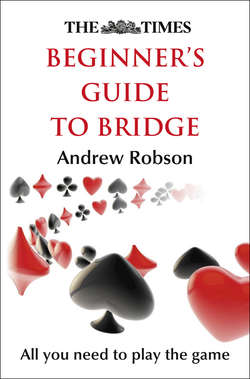Читать книгу The Times Beginner’s Guide to Bridge - Andrew Robson - Страница 41
Overcalling
ОглавлениеUnlike opening, you don’t need 12 points to enter the bidding when overcalling, but you should only enter the bidding for a reason, i.e. when you have strong cards in a long suit. Sometimes you may be able to steal the contract from your opponents, or you may simply be aiming to cause them trouble by using up their bidding space (their opportunities to communicate with each other) or pushing them to make an unwise bid at too high a level.
The crucial difference in bidding an overcall is that where an opening bid and response only promise a minimum of four cards in the bid suit, an overcall guarantees a minimum of five cards. The corollary to this is that the overcaller’s partner only needs a three-card support to make the fit of eight cards (see the following diagram).
Note that both members of the overcalling side adhere to the same guidelines – it doesn’t matter if you’re bidding directly over an opening bid, or over the response.
Here are three sample hands that would make a 1♠ overcall following your opponents’ opening bid of 1♥ (or after the bidding sequence: 1♣, Pass, 1♥).
(a) and (b) are not particularly strong hands, but there’s everything to be gained by mentioning your spades in each case: it’s the highest-ranked suit (see pp. 8 and 22) and you may go on to make a contract. Even if it’s just a case of disrupting your opponents’ bidding, and ultimately defending, you’ll have helped your partner’s defence by indicating which suit to lead.
(c) is another clear overcall of 1♠. Note that an overcall is possible with opening bid values (12+ points).
must know
• An overcall in a suit indicates five+ decent cards in the suit.
• An overcall doesn’t guarantee that the overcaller has opening points (12 or more), but equally it doesn’t preclude them.
